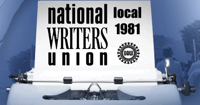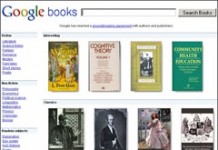
From their website:
“Judge Chin’s decision that the Google Book Settlement was ‘not fair, adequate and reasonable’ gives the National Writers Union even more reason to pursue other means through Congress and the courts to protect and affirm writers’ rights against this sort of corporate infringement,” declared Larry Goldbetter, president of the NWU, the union of freelance writers. “Because writers’ copyright infringement claims against Google have yet to be resolved, the NWU calls on Google to stop scanning without permission — now.”
After seven years of Google digitizing books without the consent of the copyright holders, the only point that is clear is that the efforts of three parties – Google, the Authors Guild (AG) and the Association of American Publishers (AAP) – to resolve the many issues involved were totally unsuccessful and left most matters yet to be decided, added Goldbetter. NWU hopes that any future settlement talks will include other writers’ groups like the NWU in addition to the Authors Guild, which, according to the judge, may have “antagonistic interests” with at least certain other writers. (Authors Guild v. Google, Inc., 05 CIV 8136 (DC 2011), p. 20. “NWU looks forward to hearing from Google, AAP and AG about how they plan to broaden the negotiations to include all those who offered substantive objections to the settlement,” stated Goldbetter.
NWU agrees with Judge Chin’s determination that certain matters covered by the proposed settlement should properly be decided by Congress, not the courts. The judge included in that category so-called “orphan works,” books whose copyright holders are not easily ascertained, and rights of foreign authors and publishers, who expressed strong objections to the settlement.
NWU would add to the list for Congressional action the creation of a nationwide, publicly funded digital library, which the settlement sought to place in the hands of Google and unnamed, privately appointed representatives of AG and the AAP. NWU believes in general that Congress is better placed than the courts to protect authors against the kind of wholesale commercial piracy undertaken by Google. NWU notes that the proposed settlement and Judge Chin’s opinion did not deal with the inherent conflict between publishers and authors over control of copyrighted books, a matter that should be addressed in sorely needed copyright reform legislation. As Judge Chin noted, citing a 25-year-old Supreme Court decision, it is “Congress’s responsibility to adapt the copyright laws in response to changes in technology.” (Authors Guild, p. 23)
“Whether in renewed and expanded settlement discussions or in Congress or both,” Goldbetter stated, “the National Writers Union looks forward to working with our litigation partners, the American Society of Journalists and Authors and the Science Fiction and Fantasy Writers of America, to assure that the rights of writers to their works are fully and fairly protected.”

































So does this decision mean that the out-of-print titles that actually no one is being paid for are now another 10 years away from freedom? Just super. Not.
The primary motivation of the Authors Guild seems to have been getting Google to fund and create a massive digital book registry. That’s been their dream for a number of years. In their obsession with that, they seemed to have forgotten that authors are a very diverse group with many motivations.
There are also remarks in the court decision that suggest the judge believed that AG’s legal counsel had little interest in protecting the interest of authors, despite being legally bound to do that. Perhaps that’s why the judge ruled that no legal fees were to be paid. AG’s lawyers were working on contingency and, had the settlement gone through, they’ve have pocketed some $30 million from Google. Now they get nothing.
I’d second NWU’s call for congressional action but add a warning that whatever Congress does needs to get a lot of visibility. Left to themselves, politicians tend to do what cash-in-hand lobbyists want them to do.
I agree with Michael’s comment about the Judge’s ruling. Also his last comment re Congress.
The history of Copyright is one of consistent prejudicial legislation against the public and for copyright holders. The Public needs to make sure it is heard on this issue. And that goes not only for the US but the EU also, and elsewhere.